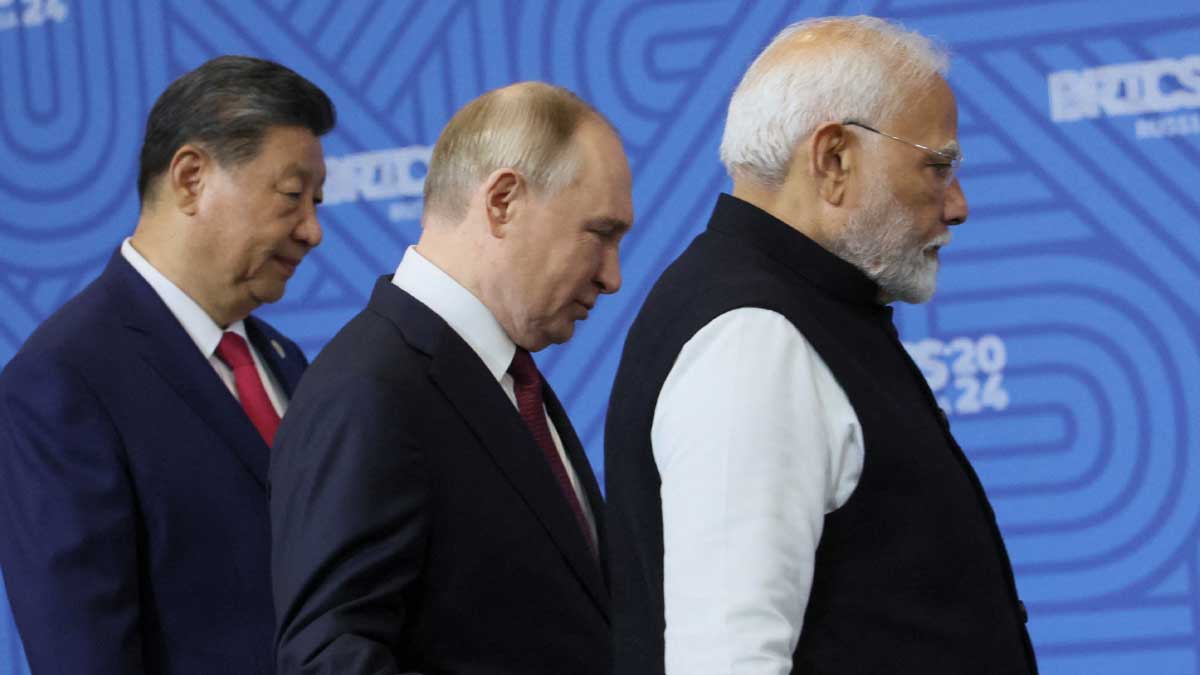- Home
- Billionaires
- Investing Newsletters
- 193CC 1000
- Article Layout 2
- Article Layout 3
- Article Layout 4
- Article Layout 5
- Article Layout 6
- Article Layout 7
- Article Layout 8
- Article Layout 9
- Article Layout 10
- Article Layout 11
- Article Layout 12
- Article Layout 13
- Article Layout 14
- Article Sidebar
- Post Format
- pages
- Archive Layouts
- Post Gallery
- Post Video Background
- Post Review
- Sponsored Post
- Leadership
- Business
- Money
- Small Business
- Innovation
- Shop
Recent Posts
India Rejects De-Dollarization Amid Trump’s Tariff Threat

India’s central bank head, Shaktikanta Das, clarified on Friday that the country is not pursuing a policy of de-dollarization. His comments came in response to former U.S. President Donald Trump’s recent threat to impose 100% tariffs on BRICS nations if they proceed with plans to introduce a common currency to replace the U.S. dollar in global trade. Das emphasized that India has not taken any steps to specifically de-dollarize its economy, and no decision has been made regarding the potential creation of a BRICS currency.
In a press briefing on Friday, Das responded to questions about Trump’s remarks, stating, “There is no step which we have taken that specifically wants to de-dollarize.” He explained that India has entered into local currency-denominated trade agreements in some instances to mitigate the risks of currency fluctuations, such as the appreciation or depreciation of the dollar. These agreements, Das pointed out, are used in certain trade scenarios but do not signal a broader policy shift away from the dollar. He reiterated that de-dollarization is “certainly not our objective.” Regarding the idea of a BRICS currency, he stated that it had been proposed by one of the member nations, but no concrete decision had been made by the group. Das also highlighted the geographical diversity of the BRICS countries, making it a more complex task to establish a unified currency. Unlike the European Union, which consists of countries in close proximity, the BRICS nations are spread across multiple continents, which would present significant challenges in implementing a common currency.
When asked about Trump’s tariff threat, Das suggested it was too early to offer a detailed response, adding, “Let the policy come first,” indicating that the matter would require careful deliberation before any definitive stance could be taken. The potential creation of a BRICS currency has sparked significant debate, particularly with the bloc’s growing influence in global trade. The BRICS group, which originally included Brazil, Russia, India, China, and South Africa, expanded last year to include Egypt, Ethiopia, Iran, and the United Arab Emirates. This expansion has further fueled the group’s ambition to challenge the dominance of the U.S. dollar in international trade.
Earlier this year, Brazilian President Luiz Inácio Lula da Silva voiced strong support for the idea of a BRICS currency, urging the member countries to establish an alternative to the U.S. dollar for global trade. The BRICS bloc, during its most recent summit in Kazan, Russia, in October 2024, discussed the concept further. A symbolic BRICS banknote was unveiled at the summit, and the group endorsed using local currencies to settle bilateral trade agreements. These moves represent incremental steps toward reducing dependence on the dollar, although they fall short of replacing the dollar in global trade immediately. The idea of a BRICS-backed currency, however, remains a subject of debate within the group, with no final decision on its creation.
Trump, however, has made his opposition to the BRICS currency proposal clear. In a post on his Truth Social platform, he warned that he would impose a 100% tariff on imports from BRICS countries if they attempted to create a common currency to replace the dollar. Trump argued that the U.S. dollar’s dominance in international trade was crucial to America’s economic strength, and he stated that any country that pursued such a plan would face severe economic consequences. His comments echoed his broader economic policies, which have often centered on protecting U.S. interests and maintaining the dollar’s central role in global trade.
Trump’s post claimed that there was no possibility of the BRICS countries successfully replacing the U.S. dollar in international trade. He added that countries attempting to do so should “wave goodbye to America,” signaling potential economic isolation. His threat of imposing a 100% tariff on imports from BRICS members if they moved forward with the currency plan underscored his firm stance on maintaining the dollar’s dominance in global commerce.
The discussion surrounding the BRICS currency proposal raises broader questions about the future of global trade and the role of the U.S. dollar. While Trump’s comments reflect a protectionist perspective, the BRICS initiative is part of a larger trend by emerging economies to reduce their dependence on the dollar. Countries like China, Russia, and India have already taken steps to promote the use of their local currencies in trade agreements, and the BRICS bloc’s push for an alternative currency is seen as part of this broader effort. However, creating a currency that could be widely adopted across such a diverse and geographically dispersed group of countries presents significant logistical and political challenges.
While the BRICS currency remains a speculative proposal, it reflects the growing desire among many nations to diversify their trade practices and lessen their reliance on the U.S. dollar. Whether this initiative will gain traction in the coming years remains uncertain, but it signals that the global financial landscape may be evolving toward a more multipolar system, where alternatives to the U.S. dollar are increasingly considered. For India, however, Governor Das has made it clear that the country’s focus remains on practical trade agreements that mitigate risks, rather than any overt attempts to de-dollarize or replace the dollar’s role in global trade.
Recent Posts
Categories
- 193 Countries Consortium Partner1
- 193cc Digital Assets2
- 5G1
- Aerospace & Defense48
- AI37
- Arts3
- Banking & Insurance11
- Big Data3
- Billionaires1,467
- Boats & Planes1
- Business332
- Careers13
- Cars & Bikes79
- CEO Network1
- CFO Network17
- CHRO Network1
- CIO Network1
- Cloud10
- CMO Network18
- Commercial Real Estate7
- Consultant1
- Consumer Tech194
- CxO1
- Cybersecurity73
- Dining1
- Diversity, Equity & Inclusion4
- Education7
- Energy8
- Enterprise Tech29
- Events11
- Fintech1
- Food & Drink2
- Franchises1
- Freelance1
- Future Of Work2
- Games149
- GIG1
- Healthcare79
- Hollywood & Entertainment203
- Houses1
- India’s 1000 Richest1
- Innovation46
- Investing2
- Investing Newsletters4
- Leadership65
- Lifestyle11
- Manufacturing1
- Markets20
- Media327
- Mobile phone1
- Money13
- Personal Finance2
- Policy569
- Real Estate1
- Research6
- Retail1
- Retirement1
- Small Business1
- SportsMoney42
- Style & Beauty1
- Success Income1
- Taxes2
- Travel10
- Uncategorized14
- Vices1
- Watches & Jewelry2
- world's billionaires1,436
- Worlds Richest Self-Made Women2
Related Articles
South Korea Plane Crash: A Tragic Loss and Global Mourning
The tragic plane crash at South Korea’s Muan International Airport on Sunday...
By 193cc Agency CouncilDecember 30, 2024H-1B Visa Debate Splits Trump Allies and Silicon Valley
The debate over H-1B visas has once again become a contentious issue,...
By 193cc Agency CouncilDecember 28, 2024Trump Moves $4B Stake in Truth Social Parent, Stock Drops 6%
Donald Trump recently transferred his 57% stake in Trump Media & Technology...
By 193cc Agency CouncilDecember 20, 2024House Rejects Trump-Backed Funding Bill, Shutdown Looms
The U.S. House of Representatives rejected a new government funding bill on...
By 193cc Agency CouncilDecember 20, 2024















Leave a comment